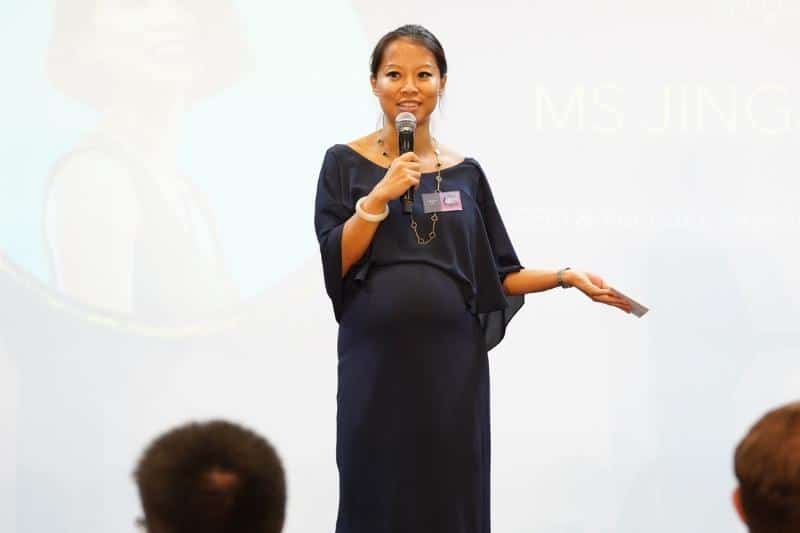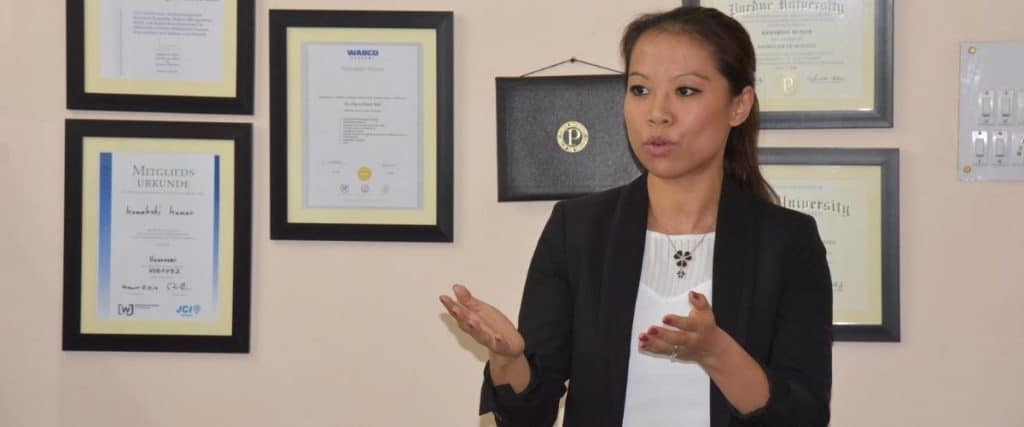Empowering women at work- to the bedroom- fempreneur Jingjin Liu’s wellness hub ZaZaZu initiates “under-discovered and unwanted” conversations on sex and wellness. Hive Life sat down with the FemTech trailblazer to talk about how her wellness hub is inspiring and instigating important dialogues, driving fundamental change, and revolutionising women’s empowerment through their platform.
Founded by fempreneur Jingjin Liu in 2020, ZaZaZu was born out of her personal calling to break the glass ceiling and normalise conversations on women’s sexuality. The platform aims to bridge the gap between women’s sexual empowerment and workplace wellness, and reform deeply rooted social norms.
Throughout her childhood, the serial entrepreneur often encountered patriarchal reinforcements, from being told “how to act as a girl” to lacking transparency on sex and wellness, up to when she ventured into the male-dominated automotive industry.
Launching her own wellness hub was just as empowering for Jingjin, as it is to many women belonging to conservative Asian communities.

For women denied of real dialogue on sexual wellness, self-gratification, and self-confidence, ZaZaZu aspires to empower them to break free of stigma and unleash their full potential, whether at home or the workplace. Facilitating change from the top of the pyramid, the wellness hub targets organisations, holding workshops, webinars, and consultations on sex and wellness with hypnotherapists and intimacy coaches.
Jingjin aspires to create value that goes beyond empowering the greater population in Asia, changing how we perceive fundamental topics around women’s sexuality, their roles, and overall wellness.

How did you start your journey as a fempreneur?
I recognised that there are so many women like me- [regardless] of having a great education, or supportive families- women across the world, even in the most advanced countries, live in a predominantly patriarchal society. We take things as they come, and never question them, as that was the way we were taught since we were born.
This has now created numerous challenges for women. While women should thrive and have their careers, [they face] many family obligations and other traditional [stereotypes], especially in Asia.
Women still struggle to have both, [a career and family life], without physically and mentally [draining ourselves]. Workplaces are not designed for women to have both. While they are moving in the right direction, they are not quite there yet.
We want to teach companies to understand the needs of modern-day working women, how can you enhance workplace culture to retain and engage more female tenants, and at the same time, to empower women to speak up for support.

What inspired you to empower women on their sexual health and wellness?
I never felt empowered as a woman. I did not have words with strong women role models, and often felt that there were many “unspoken” topics that could only be talked about among friends, behind closed doors. Most women still talk about pleasing their [partners], when it comes to sex women do not own the narrative, [without much] conversation around our [sexual wellness], and I simply wanted to change that.
Can you tell us more about ZaZaZu’s platform?
We started in 2020, as an advisory, and brought together educators from across the region, including the Philippines and Hong Kong. We had educators, sexologists, and intimacy coaches, all of whom would regularly create content based on different topics, which was shared with our readers at no cost. In addition, they can book sessions with our researchers and gynaecologists as well. We later launched our sexual wellness products, such as vibrators – which we call our pleasure essentials, as well as lubricants and others, that help women to open up and seek [gratification].

What work does ZaZaZu do to achieve this?
Our biggest challenge at that time was that women in Singapore are of Chinese heritage, and were more conservative than we expected. While people were reading our blogs, we did not see the last step happening, and struggled to convert those users.
We sought other ways for a better entry point into the women’s sexual wellness market, and decided to approach higher authority, such as gynaecologists. These professionals have helped women overcome their sexual fears, [along with] mental and physical blocks. We hosted a sexual wellness workshop with a private equity firm and discovered that a higher authority needs to come in to [facilitate] change.
Earlier this year, we pivoted our approach, and broadened our scope on women’s health. We tackle various topics that many shy away from, about women’s health, the elephant in the room, as well as microaggressions and sexism, to empower women to believe in themselves.

What change does sexual empowerment bring to the workplace and personal dynamics?
While this is a very provocative thought, to me, if we cannot simply express what we want in the most intimate parts of our life, being the bedroom, [we often lack] the confidence to ask our bosses or colleagues for what [we need] to achieve at the workplace. At the end of this narrative, it is about owning whatever you want, and [in order to do so], we first have to learn to voice out and ask for it.
We hope to make this provocative new start from our bedroom into the corporate world, as at the end of the day, it is a [similar] narrative.
How does ZaZaZu support women in navigating this landscape?
It is about creating awareness. When we run this workshop for workplaces, it has a rather shocking effect at the beginning.
For the first part, we will actually explain what we mean, because quite often people get confused about our approach and unconventional techniques. We start with the history of why women so often would not ask for what they want, and how the patriarchal system, as well as the societal structure, imposed the narrative for men and women in their sense of roles. We educate them on how they can help their partners, along with themselves, change that narrative.
During the second part, we tend to combine and educate on the similar power dynamics of the bedroom with our workplaces. We have a seven-pillar model for comparing the transferable skills we can bring from the bedroom into the boardroom.

The time for women to thrive and grow has never been better. While we are not quite there yet, we are developing the objectives to head in the right direction.
However, most of these narratives are career-centred, as we focus quite a bit on empowering women to pursue careers in the STEM area. We lack the focus and proper narratives around women’s personal lives. While modern-day women can have both, our society’s ecosystem has not made it easy.
Workplaces now delve into striking the right balance, and often talk about mental health and a work-life balance. But when you talk about our personal lives at home, it can be rather difficult to channel that narrative; we lack appreciation for women.
Women need to be vocal about that themselves, and say it is a big deal. Have autonomy when it comes to your body, your wants, and how you [express yourself]. Sexual wellness is not [just] an act, it is a whole journey of how you treat yourself.

What are the areas you focus on for women to build self-awareness?
Every individual woman is different- we struggle in various aspects in our life, which is why we run our workshops in a very individualised manner, as we understand the diverse struggle.
We target the top three struggles- their bodies, striking a work-life balance, and the power dynamics at play at home and our workplaces.
Social media plays a pivotal role- [while] it is something that we can’t prevent, we can control who we follow and what we see. Our Instagram shares or likes, and feed is [a reflection] of our habits in the virtual world. Follow accounts that give you positive energy.
Since we run workshops on body positivity and reframing self-image, microaggressions, and sexism, how to eliminate these at workplaces, and plenty more, we first understand the problems and struggles that one might go through in those organisations, as every workplace culture is different, just as women in lower management have different struggles than those in top-ranking positions.

Since its launch, how has ZaZaZu evolved its services and knowledge scope to keep up with increased and changing demands?
We started to host workshops at the beginning of the year, and have since done several [events] with corporates. We created awareness on these “unspoken” topics, and are effectively advocating to change their [reception].
We share and observe [to see] what is working and what can be improved with our workshops.
For some organisations, unfortunately, it is for them to tick the box, which is why we are hoping to introduce a B2C approach, to catch up with our previous audience, and really help them move forward.

What makes ZaZaZu’s approach unique in the wellness space?
Most people associate wellness with [self-care], however, it works on a [broader spectrum]- between our physical and mental wellbeing, a combination of the workplace and our home.
What we do differently is that we change behaviours at the workplace or home, which is a transferable skill that you could bring to either one. We bring habits into an organisation, and these small changes that individuals can contribute to and exercise, improving their personal life, and [allowing them] to feel more confident and secure with themselves.

What is next for ZaZaZu?
That would mainly be how we can further scale our wellness [concept]. In everything that I have done, I have seen purpose and impact, yet there is not much scaling.
I want to expand our offerings to a broader audience to grow, create value, and reach. We still have difficulties pitching to corporates, as not everyone understands what we are talking about, [which is why] there is a need for such an organisation and narrative, to cover topics of diversity, inclusion, and microaggression.

Interested parties can visit ZaZaZu’s website, book a session with their team, and follow them on LinkedIn and Instagram for event updates and announcements.
Related Articles
A New Wave of WellTech is Paving the Way for the Future of Healthcare and Wellness
Sextech: How is Technology Changing Sex, Intimacy and Shame?





